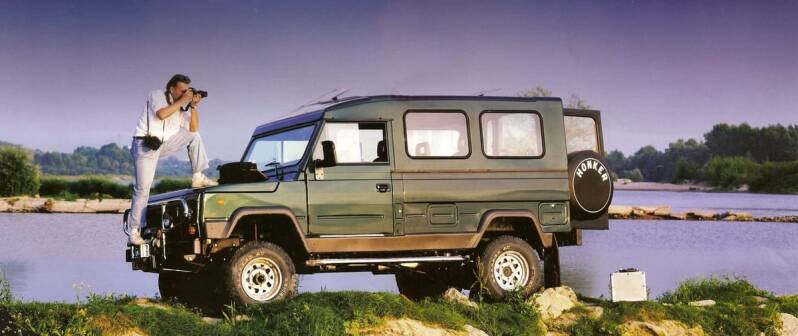






Fabryka Samochodów Rolniczych (FSR for short) was a Polish automobile manufacturer, based in Poznań. FSR was originally a manufacturer of agricultural machinery. In 1973, the production of small trucks began under the brand name Tarpan.
tarpan

1973-1995


Tarpan is the brand name of several small trucks built by the Polish manufacturer Fabryka Samochodów Rolniczych (FSR) in Poznań.
FSR car production began under the name Tarpan, named after a wild horse. The first model was the Tarpan 233. The model was available as a pick-up with single or double cab and as a combi. The chassis and engine were the same as the FSC Żuk. Later, the engine of the Polski Fiat 125p was also available.

Żuk (Polish: Beetle) is the type designation of several small trucks that were produced by the Polish car manufacturer Fabryka Samochodów Ciężarowych (FSC) in Lublin from 24 June 1959 to 13 February 1998. The FSC Żuk was essentially based on the Warszawa M20, just like the ZSD Nysa van. Due to the commonly used base, the cars could be produced cheaply and were popular in Poland.
The drive was also taken from the Warszawa M20: a four-cylinder petrol OHV engine. With 54 and later 70 hp.
After the fall of communism, the company could not hold its own against the great foreign competition. The concept of cheaply building simple cars on a standard basis was no longer accepted by the market.



The Tarpan 235 appeared in 1978. It had a new, reinforced chassis, a new front suspension and a modified body. The payload was 1 ton. Derived from this were the Tarpan 237, 237 D and 239 D, the latter had a diesel engine. The prototype Tarpan Tarpaniello was presented around 1980, many parts of which came from FSO.
Between 1973 and 1976, 8533 cars were built, in 1977 the production number rose to more than 5000 cars and in 1978 to more than 6000 cars. In the mid-80s, about 4000 cars were built annually. The Tarpan was also exported by the then state-owned foreign trade company Pol-Mot, including to Greece.
tarpaniello




The prototype Tarpan Tarpaniello was presented around 1980, many parts of which came from FSO.

In 1988 the Tarpan Honker was presented, created in collaboration with Iveco, the engines and chassis came from Fiat and Nissan. A petrol engine with 82 hp or a diesel engine with 106 hp were available as a choice. Later, engines from the FSO Polonez and other engines were also available. This model was also available as a van or pick-up. Production ended in 1996, when the factory was dissolved. Daewoo Motor Polska bought a license and parts of the company in 1996 and continued production of the Honker without continuing to use the Tarpan name.
honker



Tarpan Honker 4012, a typical hardtop with room for up to 10 passengers
Tarpan Honker 4022, a pick-up truck with room for 2 passengers
Honker (initially known as Tarpan Honker, also Daewoo Honker, Andoria Honker, Intrall Honker 4x4, and DZT Tymińscy Honker) is a Polish multi-purpose off-road vehicle. Shown as a prototype in 1984, it was produced in a variety of models. It is best known for its use by the Polish Army both at home and in Iraq. Apart from the army and police forces, the company to own the largest number of Honkers is the Polish KGHM company, which uses them to transport miners underground.
Honker vehicles were produced in multiple versions, including hardtop versions, box trucks, and pick-up trucks. Honkers produced up to 1992 used the M20 (taken from the FSO Warszawa) gasoline engines shared with Żuk and Nysa trucks. Firstly, FSR put gasoline engines from the FSO Polonez car, next 2.5-litre Iveco diesel engines (most famously used in the Renault Master and Iveco Daily), and from 1997 onwards used the Andoria turbodiesel engines 4CT90 and later 4CTi90. The truck has a three-door body, based on a rigid frame bridges driving the leaf springs.
Production models of Honker was low, reaching a maximum level of a few hundred vehicles. In Poznan in 1992, FSR built 450 vehicles in 1992; 314 vehicles in 1994; and 288 vehicles in 1995. FSR production stopped in early 1996.

In mid 1996 Daewoo bought the rights and established Daewoo Motor Poland Sp. Ltd. to produce vehicles. Production resumed in autumn 1996 trials for the assembly of Honkers in Lublin. In both factories, they built only around 20 autos.
The Honker 4032 ("Scout") model followed later and production was moved from Poznań to Lublin and produced under license by Daewoo Motor Polska from 1997 to 2001. Daewoo renewed the design of the interior and marketed the model as the Honker 2324. In September 2000, the renewed Daewoo Honker 2000 followed with some minor cosmetic changes. After the break-up of Daewoo Motor Polska, the model was continued production by Andoria-Mot.

Daewoo Honker 2000

In 1993, FSR entered into an agreement with Volkswagen AG and began production of the Volkswagen Transporter in Poznań, followed in 1994 by the Škoda Favorit pick-up and later the Škoda Felicia pick-up. In 1996, the company was renamed Volkswagen Poznań and FSR ceased to exist. This also ended the production of the Tarpan.











Create Your Own Website With JouwWeb